Key takeaways:
- Writing prompts are valuable tools for creativity, pushing writers to explore new ideas and perspectives while overcoming writer’s block.
- They foster a sense of community among writers, allowing for shared experiences and diverse interpretations of prompts.
- Using prompts can improve essential writing skills such as character development, improvisation, and regular practice.
- Prompts can facilitate personal reflection, enabling writers to connect their own experiences and emotions to their narratives.
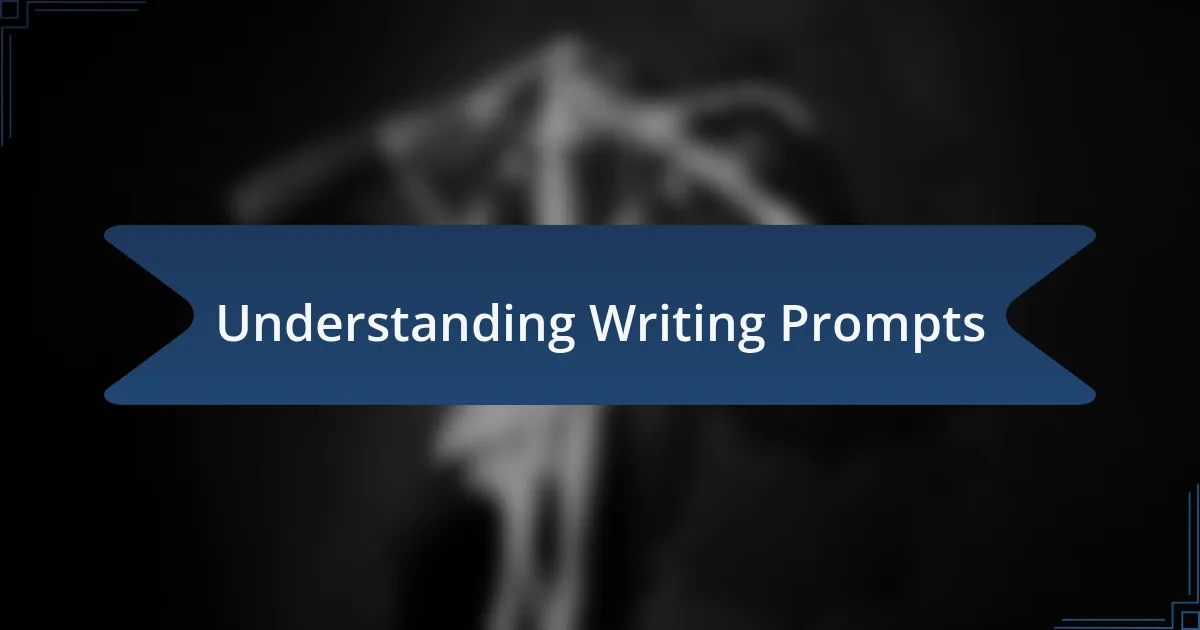
Understanding Writing Prompts
Writing prompts can often serve as creative catalysts, igniting ideas that we may not have discovered otherwise. I recall sitting with a blank page, feeling overwhelmed until a simple prompt sparked my imagination—what if a detective stumbled upon a hidden letter? It was as if the prompt whispered an untold story, guiding my thoughts in unexpected directions.
At times, prompts can feel limiting, almost frustrating, but I’ve learned to embrace them as invitations rather than constraints. I remember being challenged by a prompt that restricted me to using only dialogue. It pushed me out of my comfort zone, and I found myself crafting vivid characters and tense scenarios through their spoken words alone. Could a similar challenge unlock your creativity?
Understanding writing prompts is about recognizing their potential to expand our narrative horizons. Have you ever felt stuck? Writing prompts can help bridge that gap, offering a fresh lens through which to view our stories. They encourage exploration and risk-taking, reminding us that there’s beauty in the unexpected twists that may arise.

Importance of Writing Prompts
Writing prompts hold significant value in the writing process as they can transform a fleeting thought into a fully realized narrative. I remember a time when a prompt asked me to write about a forgotten object. This seemingly simple idea led me to create a story around an old, dusty magnifying glass found in an attic, reconnecting me with childhood memories of amateur sleuthing. Have you ever noticed how a single idea can unlock layers of emotion and experience?
Moreover, prompts can help writers overcome the anxiety of the blank page. I often face that internal struggle, but a well-crafted prompt can replace hesitation with motivation. When I encountered one asking me to narrate a scene from a new perspective, it not only gave me direction but also challenged me to think differently. Isn’t it fascinating how a few words can shift our mindset and inspire deeper engagement with our narratives?
Finally, the importance of writing prompts extends beyond mere creativity—they can foster a unique community among writers. I’ve participated in workshops where prompts were used as communal challenges, sparking lively discussions and diverse interpretations of the same starting point. Sharing our stories born from these prompts creates a tapestry of creativity that unites us, doesn’t it? Such experiences reinforce the idea that every prompt carries the potential to connect us through our shared love of storytelling.
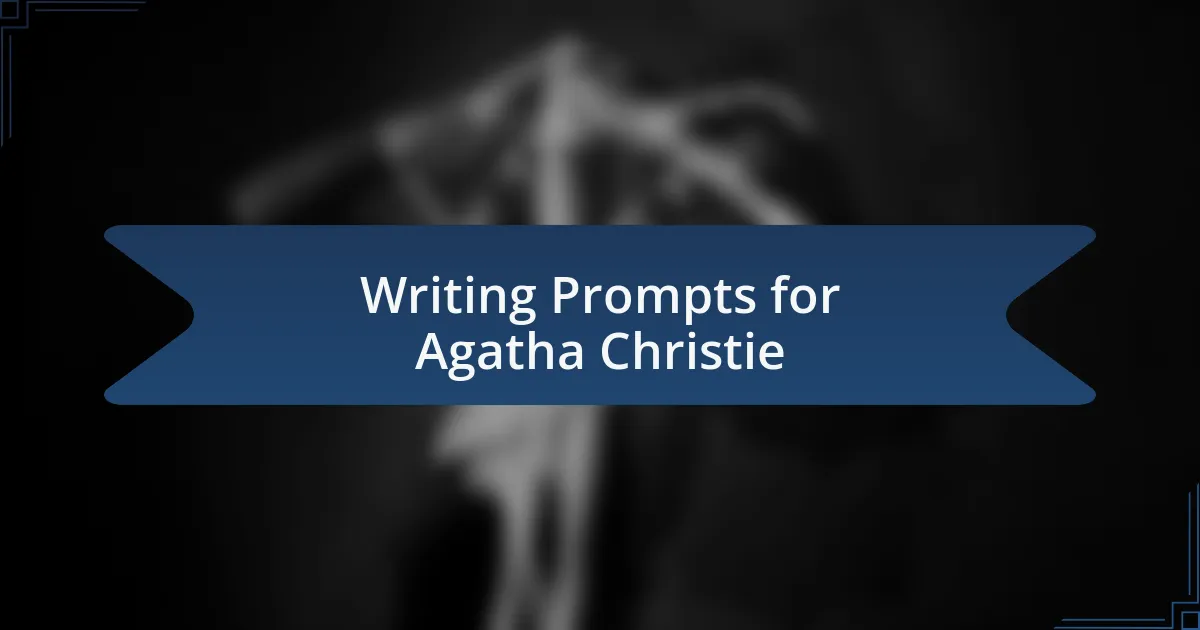
Writing Prompts for Agatha Christie
Writing prompts inspired by Agatha Christie can open the door to some truly intriguing plots. For instance, imagine crafting a story where a character discovers a secret letter hidden in a classic Christie novel. That very idea sparked a story for me, evoking the thrill of connecting the past with a present mystery. Have you ever thought about how rearranging a familiar narrative can lead to fresh storytelling avenues?
One of my favorite prompts involves placing a Poirot-like detective in an unconventional setting, such as a bustling airport. I found that situating our esteemed sleuth among hurried travelers and potential suspects not only challenged my storytelling skills but also enriched the narrative with a modern twist. Isn’t it exciting to visualize how iconic characters can adapt to new environments?
Additionally, consider prompts that explore the relationships between characters. Writing a scene where three longtime friends become adversaries over a shared past reminded me of the depths of human emotion, much like the intricate webs Christie wove between her characters. Reflecting on such dynamics can yield narratives that are not just mysteries, but poignant explorations of human nature. How often do we see friendships tested in times of turmoil, much like in Christie’s tales?
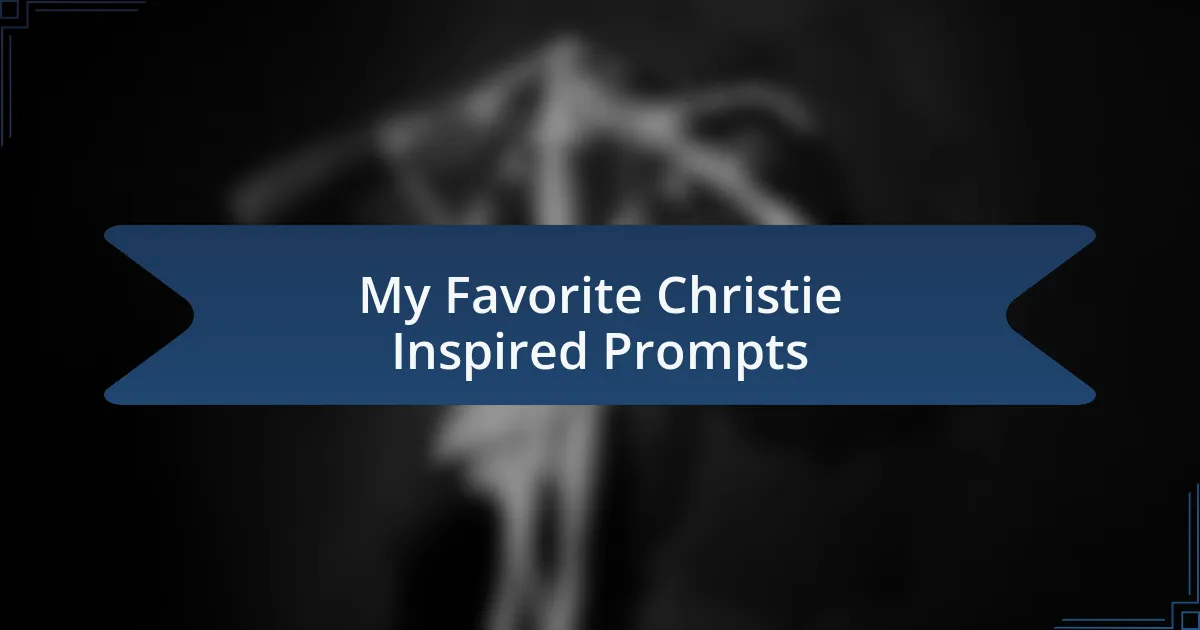
My Favorite Christie Inspired Prompts
One prompt that excites me involves crafting a story centered around an unsolved mystery at a literary festival. Imagine the tension as an author suddenly goes missing during their panel discussion. This scenario brings to mind Christie’s ability to build suspense through setting, and it pushes me to think about the interactions between the characters in a tight-knit literary community. Have you ever found yourself pondering how much we reveal about ourselves through our literary choices?
Another favorite of mine would be creating a chilling scenario where a classic Christie villain makes an unexpected comeback in the modern age. The idea came to me while revisiting “Murder on the Orient Express.” I envisioned a character eerily reminiscent of Ratchett but with contemporary motives. It made me realize the timeless nature of Christie’s themes—how greed and betrayal evolve yet remain strikingly similar across generations. Do you think the essence of evil transforms, or does it remain constant in human nature?
Lastly, I love the challenge of prompts that delve into miscommunication among characters, much like in “And Then There Were None.” Imagine writing a story where misunderstandings lead to a series of fatal events. This made me reflect on the delicate balance of trust and deception, elements so prevalent in Christie’s works. Have you ever considered how a single word or action can spiral into chaos? It’s fascinating to explore the ripple effects of communication, both clarifying and complicating the narratives we construct.
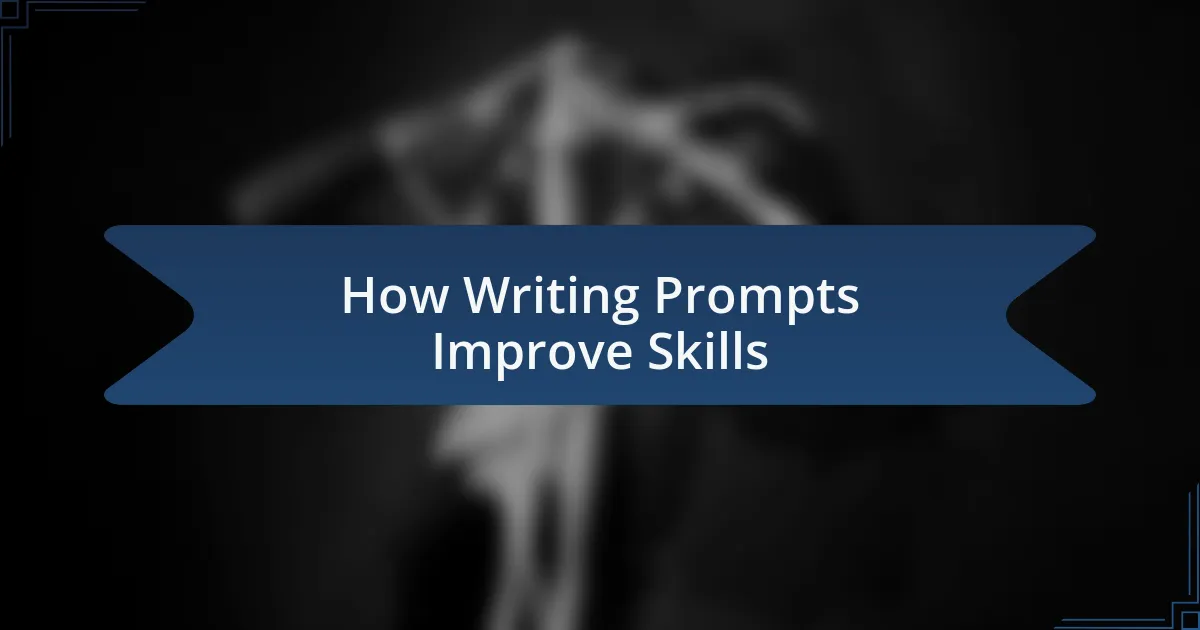
How Writing Prompts Improve Skills
One key benefit of using writing prompts is that they force me to step outside my comfort zone. I remember when a prompt had me write from the perspective of a villain, something I rarely do. This exercise challenged me to explore the darker corners of my creativity, deepening my understanding of character motivations and emotions. Have you ever found that shifting perspectives can unlock new layers of storytelling?
Another important skill that writing prompts enhance is improvisation. I once tackled a prompt that asked for a story that ended with an unexpected twist. It made me think on my feet and dig deeper into the plot. I realized how crucial it is to let go of preconceived notions and be open to where the story takes me, just as Christie often did in her works. Isn’t it exhilarating to discover an unexpected path in your writing?
Lastly, writing prompts encourage daily practice, which is the cornerstone of improvement. I’ve made it a habit to respond to a different prompt each week, and the incremental progress I’ve seen in my writing is truly rewarding. Each prompt hones my skills, making me more adept at crafting dialogue and developing plot. Don’t you find that regular practice can transform your writing voice over time?
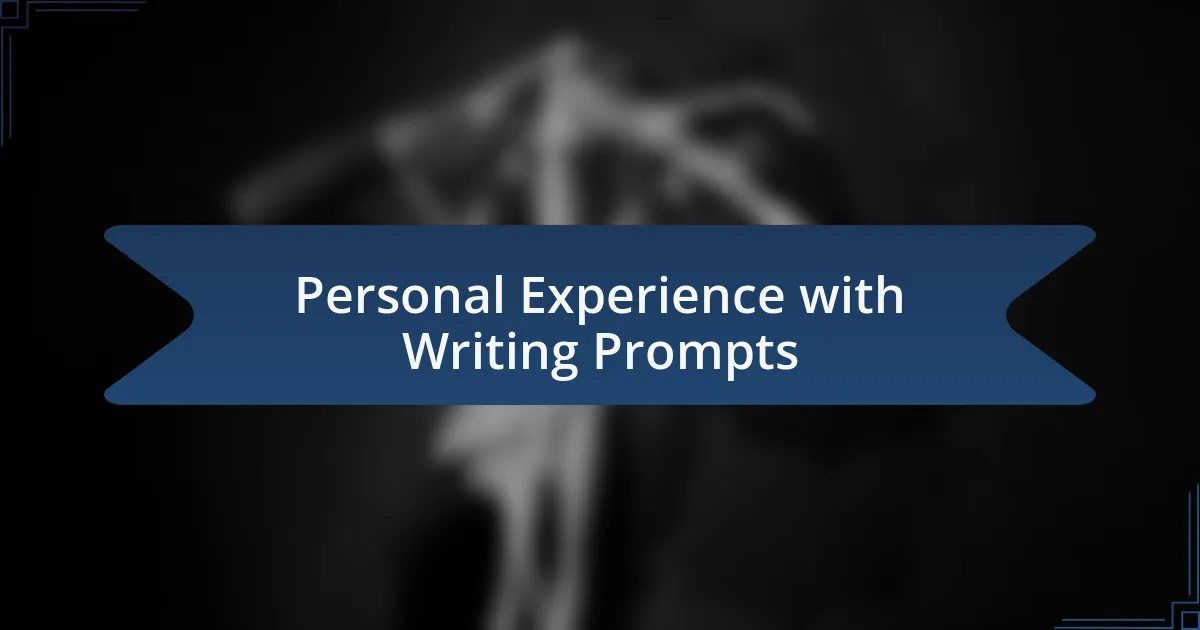
Personal Experience with Writing Prompts
Writing prompts have often been a surprise source of inspiration for me. I recall one evening when I stumbled upon a prompt asking me to describe a murder scene in a quaint village. As I let my imagination wander, I could almost hear the bustling sounds of the market square and visualize the old stone buildings. This prompt didn’t just spark a story; it transported me into Agatha Christie’s world, making me feel the weight of the narratives she crafted.
There are instances when prompts have taken me on unexpected journeys. A few months ago, I tackled a prompt that asked for a dialogue-only scene between two long-lost friends. At first, I felt hesitant, unsure of how to convey emotion through dialogue alone. But as I wrote, I discovered how powerful words can be when stripped of unnecessary description. It taught me to focus on the subtext and the emotions behind each line. Have you ever realized how less can sometimes be more in storytelling?
In my experience, writing prompts are not just exercises; they are little adventures waiting to unfold. I remember one that encouraged writing a backstory for an inanimate object. I chose an old clock that had sat in my grandmother’s house for decades. As I unraveled its history, I found myself reflecting on my childhood memories and the importance of family connections. Engaging with prompts in this way allows me to weave personal experiences into fictional narratives, making my writing richer and more authentic. How has your life influenced your storytelling?
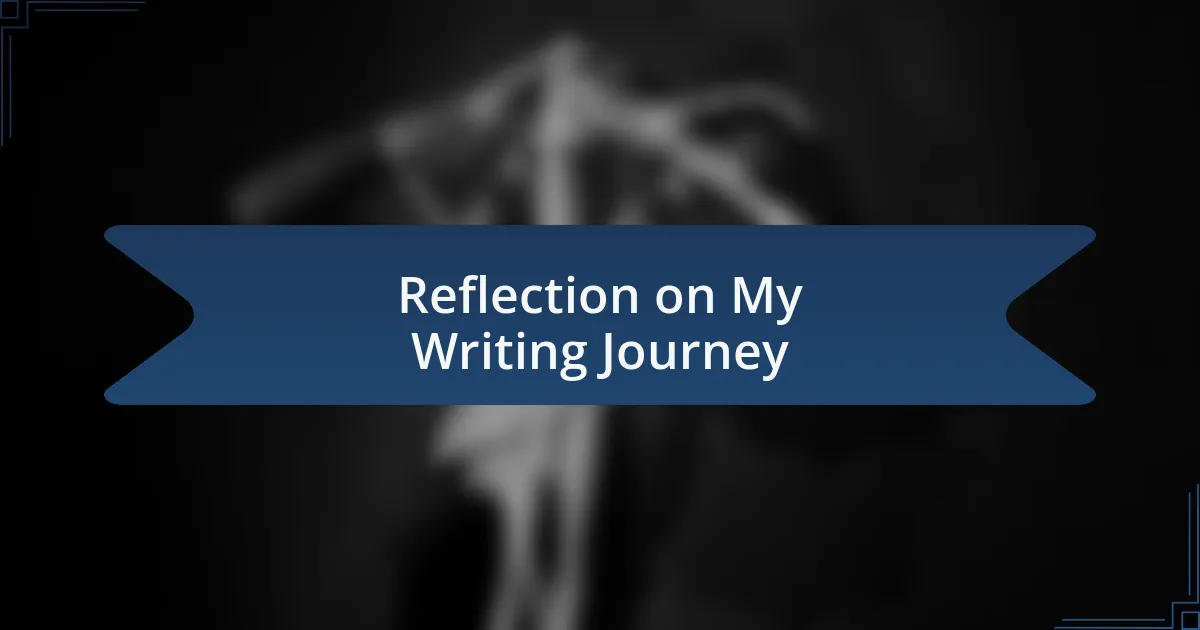
Reflection on My Writing Journey
Reflecting on my writing journey, I often find myself thinking about the moments when an idea blossomed unexpectedly from a simple prompt. One time, I came across a prompt that suggested I write a story about a hidden letter. Intrigued, I painted a picture of a woman who unearths a message from her past. The emotions that flooded through me as I imagined her rediscovering lost connections reminded me of my own experiences with letters, each carrying whispers of nostalgia and longing.
Writing prompts have taught me not only about storytelling but also about myself. There was a prompt that urged me to write about the one place I feel most at peace. As I poured my thoughts onto the page, I realized how deeply I cherished quiet moments spent by the lake near my childhood home. This exercise highlighted the significance of environment in shaping our characters’ journeys. It made me wonder: where do your characters find solace?
Through these prompts, I’ve discovered that writing is a mirror reflecting back my thoughts and feelings. Sometimes, I write to escape, and other times, I write to confront my truths. I remember a prompt on fear, where I delved into a character’s phobia. As I explored those dark corners of the mind, I felt my own anxieties manifest on the page. It’s fascinating how writing can be a form of self-discovery, guiding you toward understanding what truly matters. How has writing revealed hidden aspects of your soul?